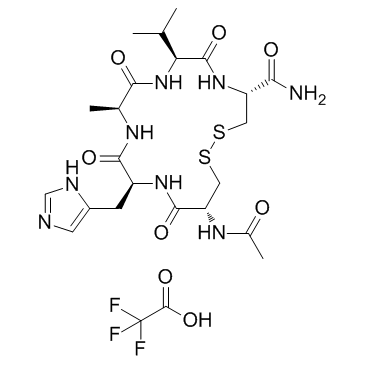ADH-1 trifluoroacetate |
| Catalog No.GC34066 |
Le trifluoroacétate d'ADH-1 est un antagoniste de la N-cadhérine, qui inhibe l'adhésion cellulaire médiée par la N-cadhérine.
Products are for research use only. Not for human use. We do not sell to patients.

Cas No.: 1135237-88-5
Sample solution is provided at 25 µL, 10mM.
ADH-1 trifluoroacetate is an N-cadherin antagonist, which inhibits N-cadherin mediated cell adhesion.
ADH-1 (0.2 mg/mL) blocks collagen I-mediated changes in pancreatic cancer cells, and is highly effective at preventing cell motility that is induced by expression of N-cadherin. ADH-1 (0, 0.1, 0.2, 0.5 and 1.0 mg/mL) induces apoptosis in a dose-dependent and N-cadherin-dependent manner[1].
ADH-1 (50 mg/kg) significantly prevents tumor growth and metastasis in a mouse model for pancreatic cancer. ADH-1 prevents tumor cell invasion and metastasis in an orthotopic model for pancreatic cancer using N-cadherin overexpressing BxPC-3 cells[1]. ADH-1, at the dosages evaluated, does not display either antiangiogenic activity in a rat aortic ring assay or antitumor potential in a PC3 subcutaneous xenograft tumor model[2]. ADH-1 (10 mL/kg, i.p.) augmentation of melanoma tumor growth is overcome through its ability to make regionally infused melphalan more effective. ADH-1 mediated augmentation of melanoma tumor growth is not altered by regionally infused temozolomide. In A375, but not DM443 xenografts, ADH-1 treatment increases phosphorylation of AKT at serine 473. ADH-1 slightly diminishes N-cadherin expression in both xenografts[3].
[1]. Shintani Y, et al. ADH-1 suppresses N-cadherin-dependent pancreatic cancer progression. Int J Cancer. 2008 Jan 1;122(1):71-7. [2]. Li H, et al. ADH1, an N-cadherin inhibitor, evaluated in preclinical models of angiogenesis and androgen-independent prostate cancer. Anticancer Drugs. 2007 Jun;18(5):563-8. [3]. Turley RS, et al. Targeting N-cadherin increases vascular permeability and differentially activates AKT in melanoma. Ann Surg. 2015 Feb;261(2):368-77
Average Rating: 5 (Based on Reviews and 28 reference(s) in Google Scholar.)
GLPBIO products are for RESEARCH USE ONLY. Please make sure your review or question is research based.
Required fields are marked with *




















